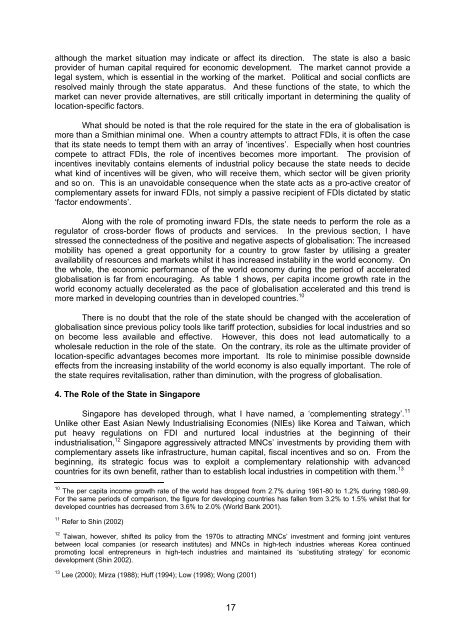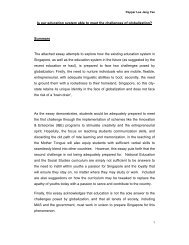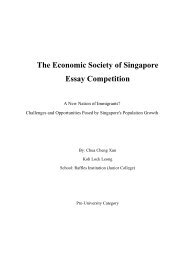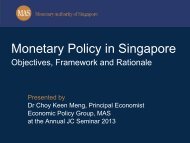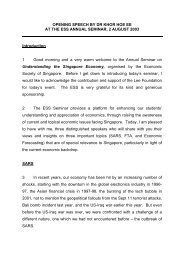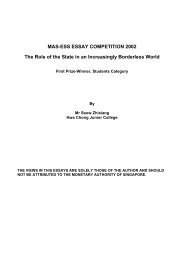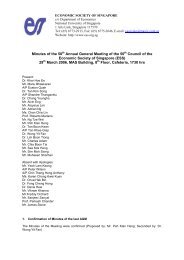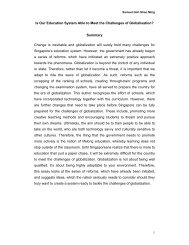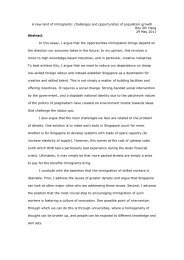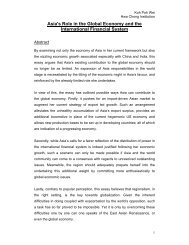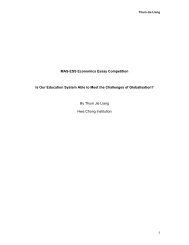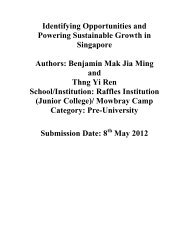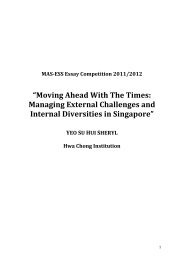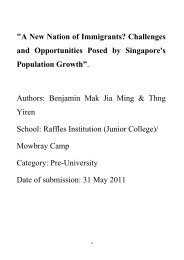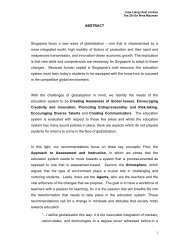the role of the state in an increasingly borderless world - Economic ...
the role of the state in an increasingly borderless world - Economic ...
the role of the state in an increasingly borderless world - Economic ...
- No tags were found...
Create successful ePaper yourself
Turn your PDF publications into a flip-book with our unique Google optimized e-Paper software.
although <strong>the</strong> market situation may <strong>in</strong>dicate or affect its direction. The <strong>state</strong> is also a basic<br />
provider <strong>of</strong> hum<strong>an</strong> capital required for economic development. The market c<strong>an</strong>not provide a<br />
legal system, which is essential <strong>in</strong> <strong>the</strong> work<strong>in</strong>g <strong>of</strong> <strong>the</strong> market. Political <strong>an</strong>d social conflicts are<br />
resolved ma<strong>in</strong>ly through <strong>the</strong> <strong>state</strong> apparatus. And <strong>the</strong>se functions <strong>of</strong> <strong>the</strong> <strong>state</strong>, to which <strong>the</strong><br />
market c<strong>an</strong> never provide alternatives, are still critically import<strong>an</strong>t <strong>in</strong> determ<strong>in</strong><strong>in</strong>g <strong>the</strong> quality <strong>of</strong><br />
location-specific factors.<br />
What should be noted is that <strong>the</strong> <strong>role</strong> required for <strong>the</strong> <strong>state</strong> <strong>in</strong> <strong>the</strong> era <strong>of</strong> globalisation is<br />
more th<strong>an</strong> a Smithi<strong>an</strong> m<strong>in</strong>imal one. When a country attempts to attract FDIs, it is <strong>of</strong>ten <strong>the</strong> case<br />
that its <strong>state</strong> needs to tempt <strong>the</strong>m with <strong>an</strong> array <strong>of</strong> ‘<strong>in</strong>centives’. Especially when host countries<br />
compete to attract FDIs, <strong>the</strong> <strong>role</strong> <strong>of</strong> <strong>in</strong>centives becomes more import<strong>an</strong>t. The provision <strong>of</strong><br />
<strong>in</strong>centives <strong>in</strong>evitably conta<strong>in</strong>s elements <strong>of</strong> <strong>in</strong>dustrial policy because <strong>the</strong> <strong>state</strong> needs to decide<br />
what k<strong>in</strong>d <strong>of</strong> <strong>in</strong>centives will be given, who will receive <strong>the</strong>m, which sector will be given priority<br />
<strong>an</strong>d so on. This is <strong>an</strong> unavoidable consequence when <strong>the</strong> <strong>state</strong> acts as a pro-active creator <strong>of</strong><br />
complementary assets for <strong>in</strong>ward FDIs, not simply a passive recipient <strong>of</strong> FDIs dictated by static<br />
‘factor endowments’.<br />
Along with <strong>the</strong> <strong>role</strong> <strong>of</strong> promot<strong>in</strong>g <strong>in</strong>ward FDIs, <strong>the</strong> <strong>state</strong> needs to perform <strong>the</strong> <strong>role</strong> as a<br />
regulator <strong>of</strong> cross-border flows <strong>of</strong> products <strong>an</strong>d services. In <strong>the</strong> previous section, I have<br />
stressed <strong>the</strong> connectedness <strong>of</strong> <strong>the</strong> positive <strong>an</strong>d negative aspects <strong>of</strong> globalisation: The <strong>in</strong>creased<br />
mobility has opened a great opportunity for a country to grow faster by utilis<strong>in</strong>g a greater<br />
availability <strong>of</strong> resources <strong>an</strong>d markets whilst it has <strong>in</strong>creased <strong>in</strong>stability <strong>in</strong> <strong>the</strong> <strong>world</strong> economy. On<br />
<strong>the</strong> whole, <strong>the</strong> economic perform<strong>an</strong>ce <strong>of</strong> <strong>the</strong> <strong>world</strong> economy dur<strong>in</strong>g <strong>the</strong> period <strong>of</strong> accelerated<br />
globalisation is far from encourag<strong>in</strong>g. As table 1 shows, per capita <strong>in</strong>come growth rate <strong>in</strong> <strong>the</strong><br />
<strong>world</strong> economy actually decelerated as <strong>the</strong> pace <strong>of</strong> globalisation accelerated <strong>an</strong>d this trend is<br />
more marked <strong>in</strong> develop<strong>in</strong>g countries th<strong>an</strong> <strong>in</strong> developed countries. 10<br />
There is no doubt that <strong>the</strong> <strong>role</strong> <strong>of</strong> <strong>the</strong> <strong>state</strong> should be ch<strong>an</strong>ged with <strong>the</strong> acceleration <strong>of</strong><br />
globalisation s<strong>in</strong>ce previous policy tools like tariff protection, subsidies for local <strong>in</strong>dustries <strong>an</strong>d so<br />
on become less available <strong>an</strong>d effective. However, this does not lead automatically to a<br />
wholesale reduction <strong>in</strong> <strong>the</strong> <strong>role</strong> <strong>of</strong> <strong>the</strong> <strong>state</strong>. On <strong>the</strong> contrary, its <strong>role</strong> as <strong>the</strong> ultimate provider <strong>of</strong><br />
location-specific adv<strong>an</strong>tages becomes more import<strong>an</strong>t. Its <strong>role</strong> to m<strong>in</strong>imise possible downside<br />
effects from <strong>the</strong> <strong>in</strong>creas<strong>in</strong>g <strong>in</strong>stability <strong>of</strong> <strong>the</strong> <strong>world</strong> economy is also equally import<strong>an</strong>t. The <strong>role</strong> <strong>of</strong><br />
<strong>the</strong> <strong>state</strong> requires revitalisation, ra<strong>the</strong>r th<strong>an</strong> dim<strong>in</strong>ution, with <strong>the</strong> progress <strong>of</strong> globalisation.<br />
4. The Role <strong>of</strong> <strong>the</strong> State <strong>in</strong> S<strong>in</strong>gapore<br />
S<strong>in</strong>gapore has developed through, what I have named, a ‘complement<strong>in</strong>g strategy’. 11<br />
Unlike o<strong>the</strong>r East Asi<strong>an</strong> Newly Industrialis<strong>in</strong>g Economies (NIEs) like Korea <strong>an</strong>d Taiw<strong>an</strong>, which<br />
put heavy regulations on FDI <strong>an</strong>d nurtured local <strong>in</strong>dustries at <strong>the</strong> beg<strong>in</strong>n<strong>in</strong>g <strong>of</strong> <strong>the</strong>ir<br />
<strong>in</strong>dustrialisation, 12 S<strong>in</strong>gapore aggressively attracted MNCs’ <strong>in</strong>vestments by provid<strong>in</strong>g <strong>the</strong>m with<br />
complementary assets like <strong>in</strong>frastructure, hum<strong>an</strong> capital, fiscal <strong>in</strong>centives <strong>an</strong>d so on. From <strong>the</strong><br />
beg<strong>in</strong>n<strong>in</strong>g, its strategic focus was to exploit a complementary relationship with adv<strong>an</strong>ced<br />
countries for its own benefit, ra<strong>the</strong>r th<strong>an</strong> to establish local <strong>in</strong>dustries <strong>in</strong> competition with <strong>the</strong>m. 13<br />
10 The per capita <strong>in</strong>come growth rate <strong>of</strong> <strong>the</strong> <strong>world</strong> has dropped from 2.7% dur<strong>in</strong>g 1961-80 to 1.2% dur<strong>in</strong>g 1980-99.<br />
For <strong>the</strong> same periods <strong>of</strong> comparison, <strong>the</strong> figure for develop<strong>in</strong>g countries has fallen from 3.2% to 1.5% whilst that for<br />
developed countries has decreased from 3.6% to 2.0% (World B<strong>an</strong>k 2001).<br />
11 Refer to Sh<strong>in</strong> (2002)<br />
12 Taiw<strong>an</strong>, however, shifted its policy from <strong>the</strong> 1970s to attract<strong>in</strong>g MNCs’ <strong>in</strong>vestment <strong>an</strong>d form<strong>in</strong>g jo<strong>in</strong>t ventures<br />
between local comp<strong>an</strong>ies (or research <strong>in</strong>stitutes) <strong>an</strong>d MNCs <strong>in</strong> high-tech <strong>in</strong>dustries whereas Korea cont<strong>in</strong>ued<br />
promot<strong>in</strong>g local entrepreneurs <strong>in</strong> high-tech <strong>in</strong>dustries <strong>an</strong>d ma<strong>in</strong>ta<strong>in</strong>ed its ‘substitut<strong>in</strong>g strategy’ for economic<br />
development (Sh<strong>in</strong> 2002).<br />
13 Lee (2000); Mirza (1988); Huff (1994); Low (1998); Wong (2001)<br />
17


